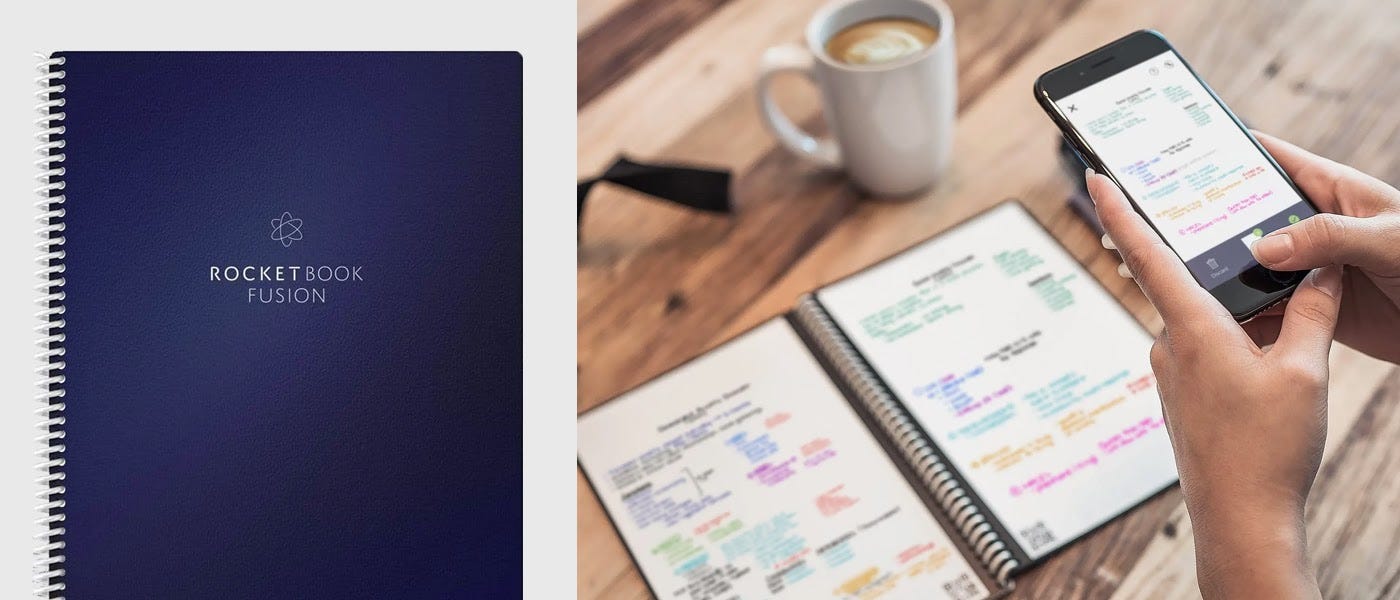Welcome to another edition of ProductiveGrowth 🌱, weekly stories about productivity, leadership, motivation, and anything else that helps us and our teams grow and be more productive. Plus, industry news on the companies, products, and services that allow us to work less and do more.
First time reading? Sign up here.
Google 'analog vs. digital handwriting' and you'll find numerous articles explaining why one is better than the other. It's not novel, but I've noticed every time I plan my week, write or brainstorm, I first open an app — Asana, docs, or Notion. I try to start writing things down, but then, I automatically close the app and shift to pen and paper.
I never knew why I unconsciously chose analog over digital in those cases, but it turns out there's a scientific explanation. When we write, we make our brains go through an abstraction process - separating something from a whole to analyze it by itself.- According to neurologist Audrey Van Der Meer, "It seems that keyboards and pens bring into play different underlying neurological processes. This may not be surprising since handwriting/drawing is a complex task that requires the integration of various skills."
Kids take months or even years to perfect their handwriting, and even when we get older, we pay attention to the way we write, the sounds it makes, and how it feels. Van Der Mee shares, "A lot of senses are activated by pressing the pen on paper, seeing the letters you write and hearing the sound you make while writing. These sensory experiences create contact between different parts of the brain and open the brain up for learning. We both learn better and remember better."
I have a good memory, but the last sentence got me thinking. Do I retain more information when I write vs. when I type? I decided to try something, and I encourage you to do it as well. I grabbed a two-year-old notebook, opened a random page, and read what it said. Next, I did the same with digital notes I had typed during the same timeframe.
Theory confirmed. I remembered many details from the handwritten note — I even recalled where I was when I wrote the entry. However, with the typed note, I even doubted if I was the one who wrote it.
Australian neuroscientist, Jared Hovarth, explains why this happens. "The very nature of handwriting means you have to write and organise as you are thinking, and that kind of organisation affects how you are interpreting the information. It's the way the handwriting forces you to organise your thoughts that leads to deeper processing."
When we type, it's different. Typing notes is easier and faster, so our brains don’t need time to analyze the information; we simply type the words as we hear or think about them.
I asked a community of online writers if they had the same impression as me when it came to using a pen and paper for creation over typing. Writer Grant Nice explained,
"This cognitive effort of condensing and translating into your own words is what facilitates learning. Which is why you could still do this with typing, but it's easy to avoid the cognitive effort of translating and condensing (and we tend toward cognitive laziness) and just type it verbatim because you can keep up."
Typing is a fast and mechanical task. We could transcribe real-time audio with our eyes closed and still be pretty accurate. As Nice says, even if we could force our brain to go through the same work it goes through when handwriting, we hardly ever do that.
In addition to Nice, other online writers and some bullet journal owners told me what they wrote down and why:
Lisa Dell is a school nurse who uses a bullet journal to organize tasks, her schedule and eliminate post-its. She believes writing things down helps her remember, explaining, "My pen and paper can be left out for me to check throughout the day easily. I just feel that having it on my phone or computer would not be a reminder, and I would not remember to keep checking it."
Brett Fridman, a writer and marketing & sales director, agrees, "I handwrite notes for conversations and lectures because it helps me remember the details. I also handwrite any complex graphics like mental maps or math equations because it's quicker. Writing feels good."
David Burt, a media and community writer, uses handwriting for two reasons, "1) Remembering: I remember things better with analog notes. 2) Brainstorming: Flexibility for drawing, arrows, circles, graphs, etc., when brainstorming. A digital doc doesn't do justice to how things could fit together."
Steven Ovadia, an academic librarian and writer, shared, "I compose with pen and organize digitally. When I want to think (i.e., create), I handwrite. When I don't want to think (i.e., organize), I go digital."
It's not a surprise they all choose handwriting when they need to create or remember something.
Up to this point, we’ve discovered handwriting is better than typing for memory and processing information. Here’s why those concepts are crucial to productivity:
To remember pending tasks and to set goals to achieve them.
To understand, internalize and remember how to perform a new task.
To improve your focus and concentration.
To come up with insights for process optimization or problem solving.
If the problem with typing is we do it faster and skip steps, how about digital handwriting using a tablet? It should be the same, shouldn’t it?
Eh, this is hard to answer with data since there are not enough studies to prove it. But logic tells us it should!
The thing is, digital handwriting feels different. The screen of a tablet feels like a screen; people describe it as writing on glass.
However, Lynn Nicholas, project manager and bullet journal owner, merges the old pen and paper with digital handwriting. For her, it has the same effect. "I use my iPad and Apple pencil to write everything down like pen and paper. The more a person writes, the more a person remembers."
I have my take on this particular debate between digital and paper handwriting. Our brains evolve at a lower rate than technology. "So our societies and world evolved rapidly in the past 300,000 years, while our brains evolved slowly... We did it not by adapting our brains but by changing our cultures," writes Nick Longrich for the Conversation. We may have access to technology, but that doesn't make our brains different from Plato's.
All of this makes me believe we need more time for our brains to adapt to writing on glass, or technology needs to advance enough so that writing on tablets feels like writing in a notebook (which, in fact, already exists. Like the reMarkable 2, for example.)
Keeping notes on paper is not perfect.
I think it’s clear I’m #teamhandwriting, but I know there are some downsides to it. It’s not eco-friendly; there’s no way to automatically back-up the data; plus it’s hard to find entries and edit them.
Even if some companies are trying to solve those problems by making reusable and smart notebooks (I left you more information on this in the Discover section below), it still doesn’t make paper perfect.
Don’t get me wrong. I do use several digital apps for writing. In fact, I wrote this piece using Google Docs. I spent a lot of time organizing and editing my thoughts, the same way I would’ve done it if I had handwritten it.
However, this article made me realize my preference for analog over digital has nothing to do with creation, but productivity.
Productivity apps overwhelm me. They offer infinite capacity. I end up adding, together with on-going and crucial tasks, a long list of nice-to-have tasks that I didn’t actually think through. Instead, when I list my pending tasks in a notebook, I stick to ongoing tasks and priorities.
Memory is a key component in the way I work. I usually remember everything I need to do, and probably check my notes only two or three times a week.
Naturally, when I check the app at the end of the week, all I see are a few completed tasks along with many other trivial ones I forgot to do. But when I check my notebook, I can see everything is completed. Not only because I remembered the important things, but also because I gave more thought to the task I wrote down.
Now that I understand what happens to the brain when writing by hand, typing and digitally writing — and why I always choose a notebook over a productivity app— I might consciously give digital apps a try.
There are some incredible tools available. By taking the time to process my thoughts before using these tools to enter only my priorities, who knows? In a few months, I might end up writing an issue about how I absolutely love typing.
Let me know in the comments if you’ve been through this and if you’re team typing or team handwriting.
Best,
Camila.
Edited by: Lauren Maslen.
EDITOR’S PICKS
📚Build the Perfect Productivity System with Paper Notebooks and Digital Tools- There are hundreds of different options and techniques to organize your workload. Apps, notebooks, tablets, etc. This article shares a handful of accessible and easy-to-use options to help you choose the method that works best for you.
IN CASE YOU MISSED IT
We tend to conflate corporate communication with tedious, broad, and confusing language. But corporate communications don’t need to be like that. The way we communicate with our employees can change how they feel about the company. To avoid sounding like you have a secret agenda, and to discover how to communicate with purpose, read PG’s February 21 issue.
SCROLLING THROUGH

Tiago Forte is a productivity expert and founder of ForteLabs. I second this tweet. We might be involved in several projects, but we don’t need to have them occupy all of our minds 24/7. Take notes, organize and work on one thing at a time.
DISCOVER
If you’re a pen and paper kind of person but are terrified to lose your journal and data forever, keep reading! This Rocketbook Fusion is a reusable smart notebook, and it’s advertised as “the last notebook you’ll ever buy.” It comes with different templates, its own pen, and a towel to keep its reusable pages clean. Once you scan the pages, they immediately upload to the cloud. Check out the full review here.
What did you think of this issue?
👋 This is a subscriber’s post! Make sure to participate in the comments, I’d love to 👂hear what you think.
TO CONTRIBUTE
Write a guest post, share your story, or recommend an article: reply to this email or submit here.
Have a piece of news, release, review, job, or event to submit: submit here.
Want to advertise or sponsor a post: inquire here.









I also wrote about the preference of using handwriting for daily planner a little while ago: https://medium.com/super-simple-draw/get-productive-with-super-simple-draw-daily-planner-3f51101d7c1e
I do think that digital handwriting is the best of both worlds. Writing on glass is a little awkward by can be quickly adapted too, and it has the same benefits of visualization, slower pace and intentional space planning/organization, all of which help memorization.
Is the Rocketbook Fusion review link correct? I get directed to “Graduate College With EXCELLENT Credit” which seems unrelated